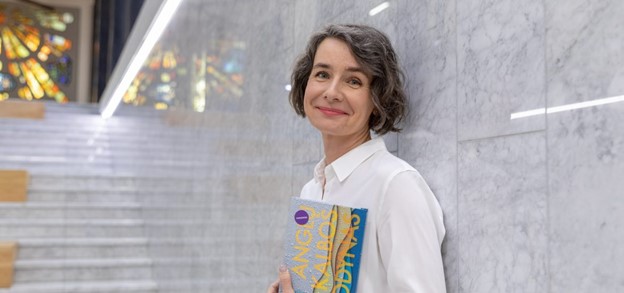
Australian-Lithuanian Author Akvilina Cicėnaitė
Akvilina Cicėnaitė was born in Vilnius in 1979. With a Master’s degree in Literary Theory from Vilnius University and a doctorate in Religious Studies from Victoria University in Wellington, she worked in advertising and communications, and has lived in Sidney for ten years. She describes her life as a balancing game of two realities. When she visits Lithuania she forgets that she lives in Australia, and it’s difficult to leave her comfort zone in Australia and return to life in Vilnius. A writer of young adult literature, she has won various awards in that category, and is well-known by Lithuanian youth especially for her book Niujorko respublika (The Republic of New York). For adults she published the novels Tylos istorija (The History of Silence) in 2017 and Anglų kalbos žodynas (English Language Dictionary) in 2022. She knew she wanted to be an author at an early age, but never believed she could reach what she thought of as “that echelon of mysterious immortals”.
Interviewed by the online magazine Pasaulio lietuvis (World Lithuanian), Cicėnaitė noted that she is torn between Vilnius and Sidney – a sentiment described in her book English Language Dictionary, which takes the reader on a journey through Australia and through her own life. It won the Jurga Ivanauskaitė award this year.
Interviewer Indrė Pliuškytė-Zalieckienė asked her about the challenges of living abroad and being a writer at the centre of the literary world in Lithuania. The author spoke of the difficulty of being far from her cultural environment and her readership, because she visits Lithuania but once a year. Yet the distance allows her to take a fresh look at many things, and the anonymity of living in a large metropolis helps her focus on what is most important – her writing. The multiplicity of her surroundings in Sydney provides inspiration, as well. She may have written very different books had she not left Lithuania.
In Australia she works mostly alone, writing and translating, whereas in Lithuania she is busy with book launches, meetings and events. Life in Sidney is more predictable, but comfortable, and more productive as well. In Vilnius she returns to herself, and although her visits are short, she observes its changing features. Cicėnaitė notices that as time goes on, being “between” two countries has its limits – and finally the time comes to choose. For some time she felt it was possible to have two homes, and even romanticized that kind of life, but recent events have changed her views on being a citizen of the world, and what the concept of home means, as an obligation, a life choice. When one tries to be “home” in both places, there is a danger of belonging fully to neither.
An interesting question raised during the interview was the influence of English in Lithuania and its untranslatability. During a session with high school students in Vilnius, their lack of motivation to do well in Lithuanian language studies was a point of discussion. Many think they will later study abroad and will need only English. And its influence is growing in Lithuania. Cicėnaitė agreed that it is very difficult to explain to students that the Lithuanian language is their strength and their essence, their springboard even out in the wider world. More important than fighting the influence of English is strengthening the conviction that the Lithuanian language is our power, our identity and our history.
For Lithuanians contemplating life between two countries, she advises that aside from the attraction of the exotic and the joy of discovery in a new country, they should also consider the cost of choosing – leaving loved ones behind, the longing, and even the travelling, which is not a sustainable choice in a life divided.





























